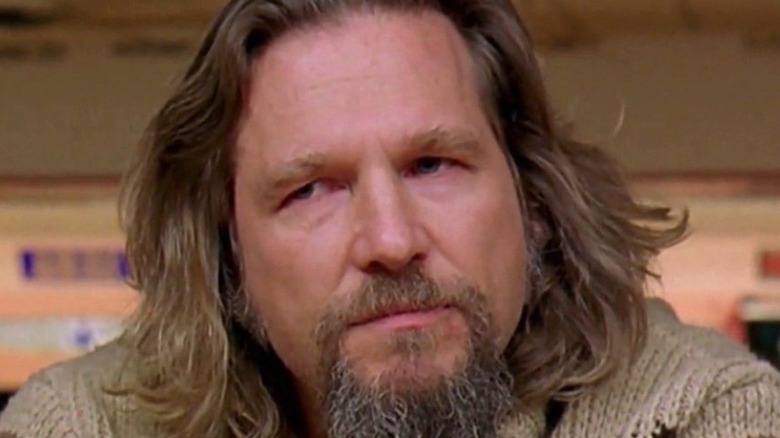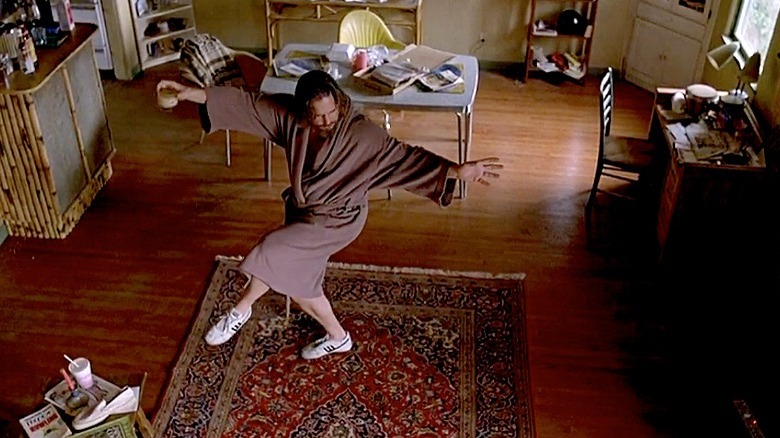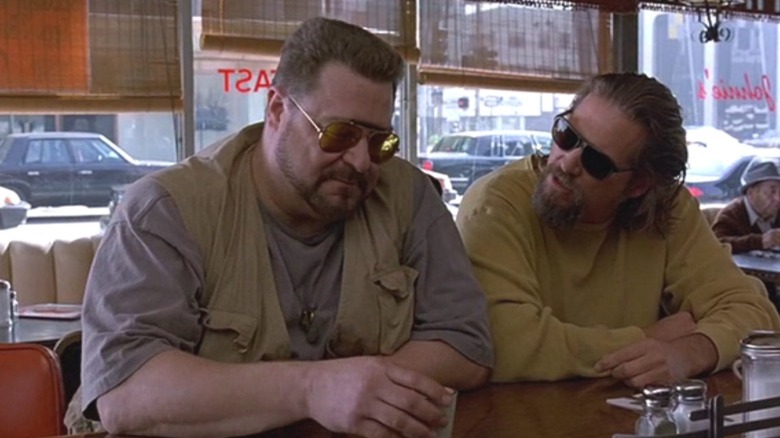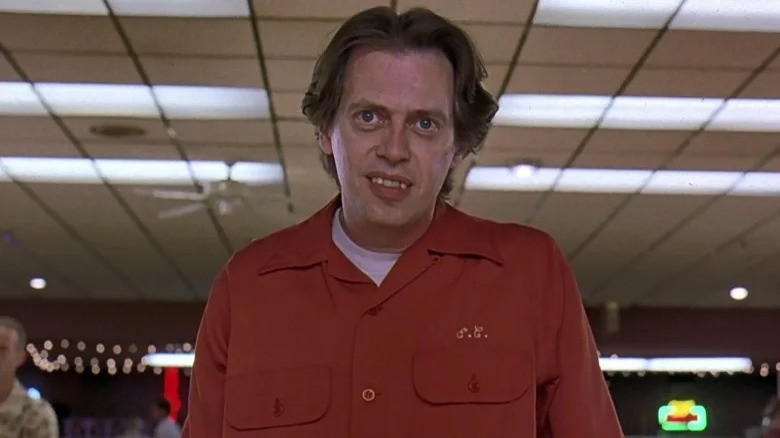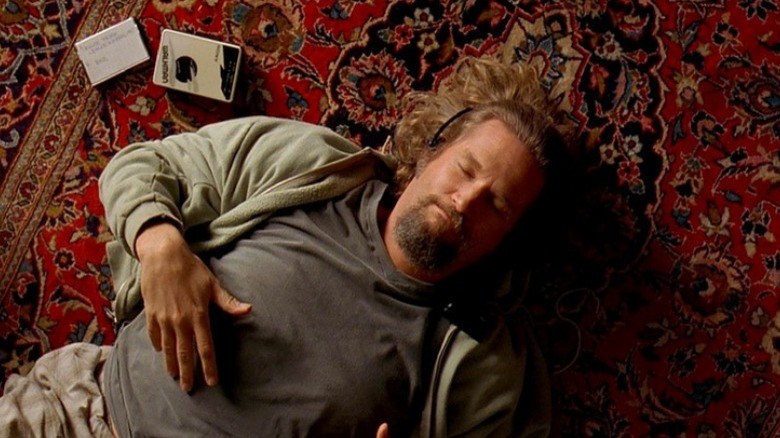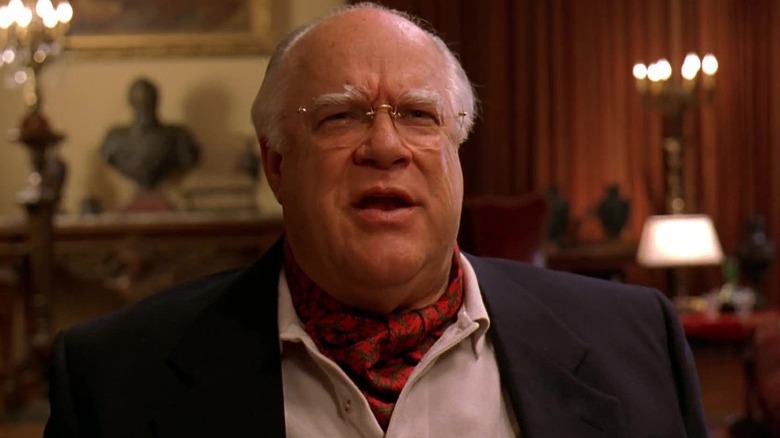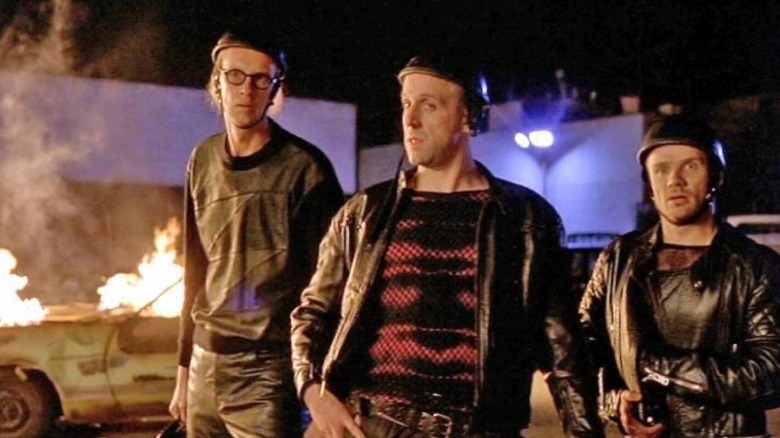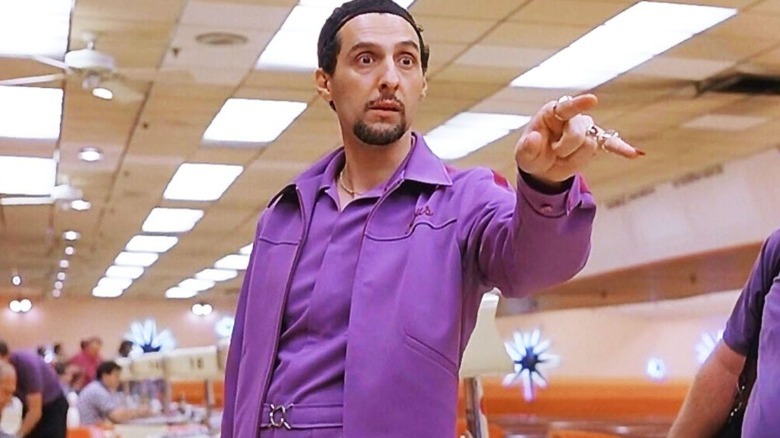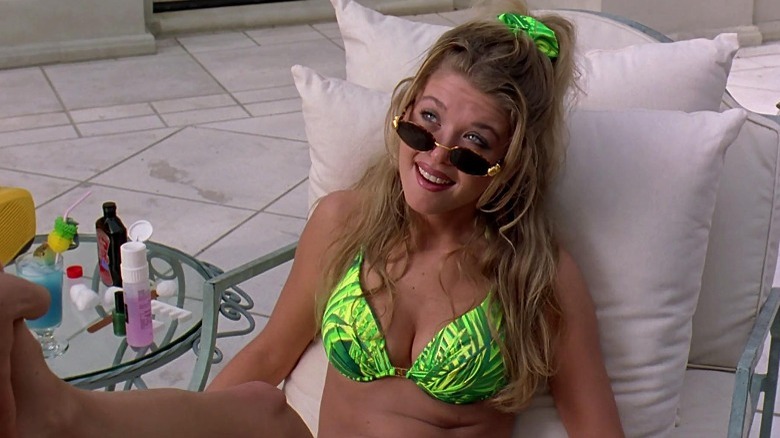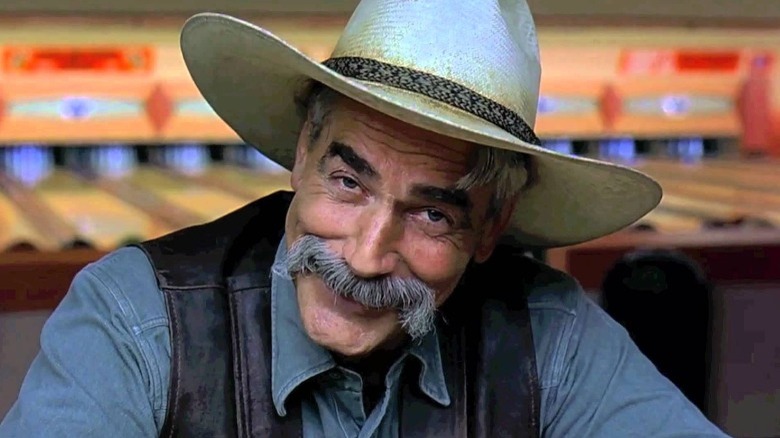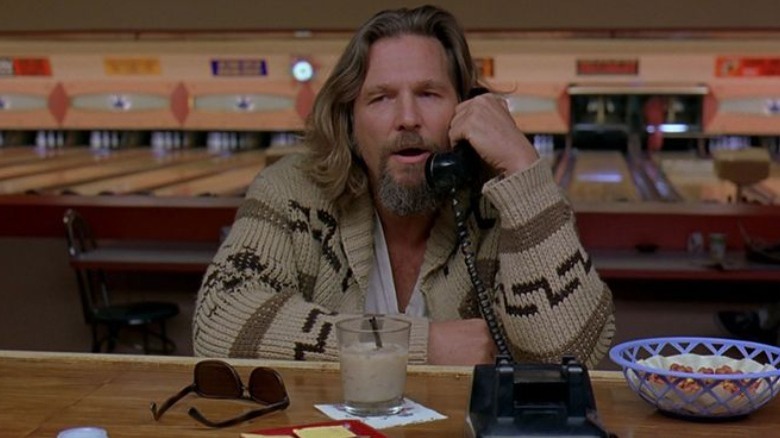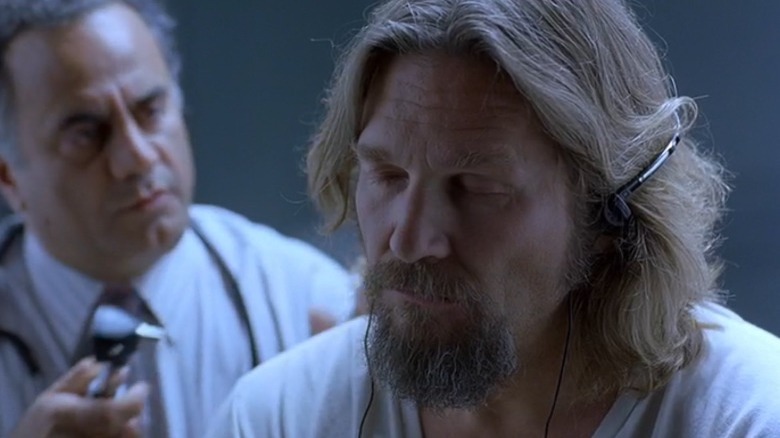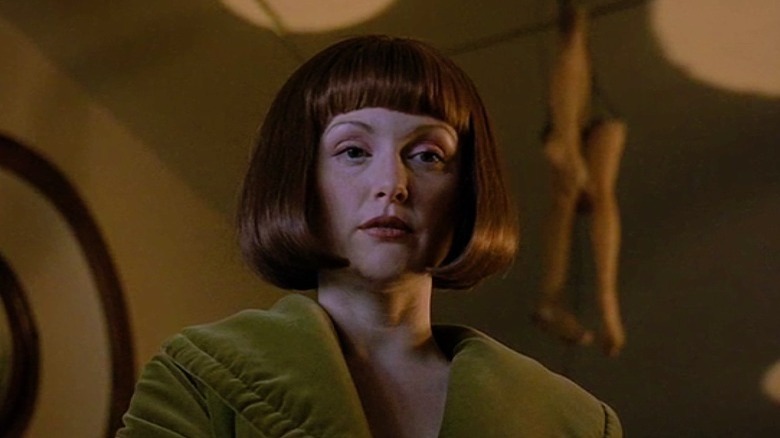Biggest Unanswered Questions In The Big Lebowski
The Coen brothers' cult classic "The Big Lebowski" is such a touchstone for an entire generation of movie fanatics that it can be easy to forget it actually has a plot. An offbeat, unique stoner riff on the classic Los Angeles private eye stories of Raymond Chandler like "The Big Sleep" or "The Maltese Falcon," it follows Jeff Bridges as The Dude, a larger than life character (with a real life inspiration). The Dude gets roped into a mystery involving a seemingly-kidnapped trophy wife, a stolen car, a porn magnate, and a whole lot of dead ends and White Russians. It veers from capitalism to nihilism to its own shambolic philosophy, best summed up as "The Dude abides."
The mystery turns out to be a bunch of sound and fury signifying nothing, in the parlance of Shakespearian times, as the plot itself takes a back seat to the overall vibe. That lack of emphasis on the small details might be why "The Big Lebowski" initially confused audiences and bombed at the box office, but it has since grown into a cultural phenomenon including quote-alongs, a festival that has run for two decades, and a place of honor in the Coen's vast filmography. As revered as the screenplay is, it doesn't tie up all the loose ends, even by its own shambolic terms. These, then, are the biggest unanswered questions in "The Big Lebowski."
How can The Dude afford to live in Los Angeles?
The first time viewers lay eyes upon The Dude, he's writing out a check for 69 cents so he can buy some half and half for his beloved beverage of choice. Clearly, this is not a man of means.
Yet, The Dude lives without roommates in Los Angeles, historically one of the most expensive cities in the country. As the narrator (Sam Elliott) explains, The Dude is in the running for "laziest in Los Angeles county," and although it's all well and good that "sometimes there's a man" that fits right into his time and place, how does that man feed himself if he doesn't have three quarters to rub together?
The biggest clue to The Dude's financial viability might be the meek, amiable attitude of his landlord, Marty (Jack Kehler). The Dude attends Marty's dance cycle, and even brings two friends along, which is not only wonderfully supportive but clearly buying him more time to pay his already overdue rent.
Even after the events of the movie, The Dude (or His Dudeness, or Duder, or El Duderino if you're not into the whole brevity thing) doesn't walk away with any of the financial windfalls various "clients" have promised him, so his future is unclear. Somehow, this Dude abides in eternal self-imposed poverty in the city of angels.
What's the history between The Dude and Walter?
Based on what The Dude has to put up with, there may be no more one-sided friendship in all of cinema than the one between him and Walter Sobchak. In one of John Goodman's best roles in a long and varied career, Walter is a highlight as a hilariously unpredictable element of chaos in The Dude's life. He flashes his gun on the bowling lane (during a league game no less), fouls up the drop-off, destroys a random car, and seems to be at least somewhat responsible for Donny's death.
It's hard to watch the film without wondering how, exactly, The Dude and Walter met in the first place, and what bond they share that would have such a chill Dude so unfailingly devoted to someone so decidedly unchill.
Sure, The Dude takes Walter to task from time to time, even telling him to leave him alone at a certain point — but he'll always be at practice.
Why is Walter so impatient with Donny?
The group dynamic between Walter, The Dude, and third wheel Donny (Steve Buscemi) is the comic heart of "The Big Lebowski." In a strange and unexplained pecking order, Walter and The Dude treat each other more or less as equals, but nearly every time Donny opens his mouth, Walter vehemently tells Donny to shut up (with curse words consistently thrown in for emphasis). Why does Walter detest the very idea of Donny contributing to the conversation? It's so much an instinct for Walter, in fact, that when Donny helpfully points out that they've posted the bowling league schedule, Walter instinctively screams at him before processing the statement enough to ask: "When do we play?"
This is in stark contrast to the calming tone Walter uses when the gang is confronted by the nihilists at the end of the movie, his quick attention when Donny suffers a heart attack, or the clear sorrow after his friend's death. Obviously, Walter considered Donny a friend on a deep level, but why didn't he ever let the guy get a word in edgewise? Instead, he chose to treat him like a child who had just wandered into a movie and had no frame of reference.
Did the Dude ever get a new rug?
It's almost criminal that the movie never gives the audience resolution about The Dude's rug.
The catalyst for the film's entire story occurs when The Dude's rug gets micturated upon in a case of mistaken identity. He briefly obtains one from the Big Lebowski (David Muddleston), but it is abruptly taken back by Maude Lebowski (Julianne Moore), and The Dude wakes up on a barren floor once again. The Dude's rug, perhaps one of the all-time best cinematic MacGuffins, ultimately plays out like Charles Foster Kane's sled: a mystery cast aside at the end of the film, effectively telling the audience it was always more about the journey than the destination.
Does the room ever get tied back together? Inherent to The Dude's philosophy is that his needs are meager, in comparison to the mislaid ambition and grand schemes of everyone around him.
Did Maude recover the money from her father?
Probably the most dissatisfying thing about "The Big Lebowski," if you were expecting a story with clear resolution, is the lack of justice for the richer, older Jeffrey Lebowski. The phony figurehead is revealed to have used the opportunity of his trophy wife's kidnapping to embezzle a million dollars from his own charitable foundation, hoping to blame the loss of the money on The Dude — even if it meant his wife would end up dead.
In the end, it's reasonable to assume The Dude will fill Maude Lebowski in on his revelations, although there are never any follow ups about the money itself. Presumably, with a non-profit board of directors to answer to, Lebowski wouldn't be able to cover his misdeeds for very long, and the funds would be restored to the Little Lebowski Urban Achievers (and proud we are of all of them). "The Big Lebowski" undercuts this yearn for justice brilliantly, by having the overzealous Walter drop the disabled veteran Lebowski from his chair instead, reducing him to a sobbing mess.
What became of the nihilists?
The nihilists have perhaps the worst time in "The Big Lebowski," collectively speaking. What they figured would be a quick fake-kidnapping scheme has been drawn out interminably, as they receive a bag of dirty undies instead of money, and then get seemingly stonewalled by a hapless Dude, unaware he never had money to pass to them in the first place. For their trouble they have a missing ear (involuntary), severe injuries from a bowling ball to the gut, and a girlfriend with a missing toe (voluntary).
As Maude reasonably points out, it was foolish of Uli and company to pretend to kidnap someone they're publicly known to be associated with like Bunny Lebowski, so if the police ever start looking into some part of this story they're pretty likely to go to jail. But other than their repeated insistence about believing in nothing and a penchant for ferrets, the audience doesn't learn much about the nihilists and are left to guess at their fate. Their petulance in the fight scene near the movie's end indicates that, at the very least, they believed in the power of a million dollars to inject some meaning into their otherwise empty lives.
How did Walter and The Dude do in the bowling league?
"Let's go bowling" is the family-friendly part of Walter and The Dude's persona, and a fair amount of "The Big Lebowski" is devoted to the stakes of the league in which they and Donny form a team.
During a "league game," however, Walter is so intense in his sportsmanship that he pulls a gun on a competitor, insisting he stepped over the line. Unfortunately this violates several of the leagues bylaws and results in an official investigation, as viewers learn from The Dude's answering machine.
But not only are the results of that investigation never divulged, but viewers are left to speculate as to how Walter and The Dude fare in the next round robin without Donny. After an entire montage and multiple scenes are spent introducing upcoming opponent Jesus Quintana (John Turturro), the actual showdown in the semis remains a mystery (it's not even addressed in the Jesus-centered quasi-spinoff "The Jesus Rolls").
Do the Knutsens find out what happened to Fawn?
One of the more rewarding disparate threads in "The Big Lebowski" is the reveal of who has been following The Dude around in a Volkswagen Beetle for the majority of the film. It turns out to be Da Fino (John Polito), an actual private eye that's mistaken The Dude as a peer while searching for Fawn Knutsen in a standard "wandering daughter job." A high school photo reveals that Fawn in fact faux-kidnapping victim Bunny Lebowski.
Despite Da Fino's enthusiastic offer, The Dude declines to "pool resources," and as a result the viewer is never given any indication of whether Da Fino gathers enough about Fawn's new life to bring back to her parents. One of the best sight gags in the movie is the dreary, black and white photo of the family farm in Moorehead, Minnesota that they hope will make her homesick. Despite owing money all over town and being on the outs with her husband, one can't imagine Bunny has any intention of trading her glamorous Los Angeles life for one straight out of another beloved Coens movie, "Fargo."
Who was The Stranger?
Sam Elliott's charming narrator The Stranger, the seemingly omniscient driving force behind "The Big Lebowski," is clearly a purposefully unanswered question. He's the spirit of the West, of old Hollywood, or of Los Angeles itself in a way, and his benevolent charm is the foundation of whimsy that the entire movie hinges on. But what does it mean that he wanders in to the story near the, imparting a philosophy of equanimity to The Dude?
If he doesn't exist per se in the story, how does The Dude repeat his advice later in the movie? The Stranger has human traits (like an affection for a good sarsparilla), awkwardly walks the wrong direction for an amusing moment in his second scene with The Dude, and finds the film's protagonist endlessly fascinating.
Perhaps, he's nothing more than an avatar for the Coen brothers themselves, there to inject some self-aware humor into their own story by asking The Dude "do you have to use so many cuss words?"
How did Maude know to call The Dude at the bowling alley?
One of the small plot holes in "The Big Lebowski," noticeable perhaps only after you watch it several dozen times, is when Maude calls The Dude at the bowling alley to ask to see him again for an update on the kidnapping. It's a small thing, and transitions the film from a surreal conversation with The Stranger back into the hazy plot of the movie, but how did she know to call him there?
At this point, halfway through the movie, Maude knows where The Dude lives but has no reason to know what specific bowling alley he frequents. Is she having him followed? As it later turns out, she's been insisting he see a doctor because she's considering him for a sperm donor, it is perhaps plausible that she's had The Dude investigated thoroughly by an actual private investigator, but this is never established.
If she already knows where he is, why not just send her driver to pick him up as she did before at his house? It's a minor nitpick, but it stands out in a movie that otherwise keeps its loose ends tied up tightly, even in multiple viewings.
What did The Dude think the doctor's tests were for?
After her goon cracks The Dude on the jaw, Maude insists that he see a doctor that she repeatedly recommends as "a good man, and thorough." It turns out the doctor was specifically giving The Dude some sort of comprehensive exam on Maude's behalf, in her interest of having The Dude father her baby. This presumably means that The Dude was given a full STI screening, and perhaps even a fertility test or two when the doctor asked him to slide his shorts down.
So what, exactly, did The Dude think those tests were for? He doesn't put anything together until Maude is in the middle of a pose to increase the odds of conception, and it pushes the limits of his general stoner obliviousness to believe he really didn't think twice about such a "thorough" examination. The Dude might not the smartest guy in the world, but he is the author of the (original) Port Huron Statement. He sort of went to college: you'd think he'd put two and two together where his own body is concerned.
Does The Dude see his child?
The circle of life spins around as "The Big Lebowski" concludes; Donny's untimely passing is lightened a bit by The Stranger informing viewers that there's a "little Lebowski" on the way, so presumably Maude's plan to conceive a child was successful. But will The Dude really stick to her proposed plan to not be involved in his child's life, or even to be someone that she sees socially? What was he planning to explain about himself to Maude before she cut him off? Will fatherhood change The Dude, or is his fundamental Dudeness immutable and eternal?
It seems like, at the very least, The Dude could be a chill sort of uncle figure to his progeny on the sly, bringing a warmth to the kid's life. Between the child's mechanically pretentious mother, vain blowhard of a grandfather, and chaotic adult film star step-grandmother, this future child could definitely use The Dude's calming influence — even if they might also learn a fair amount of curse words.
